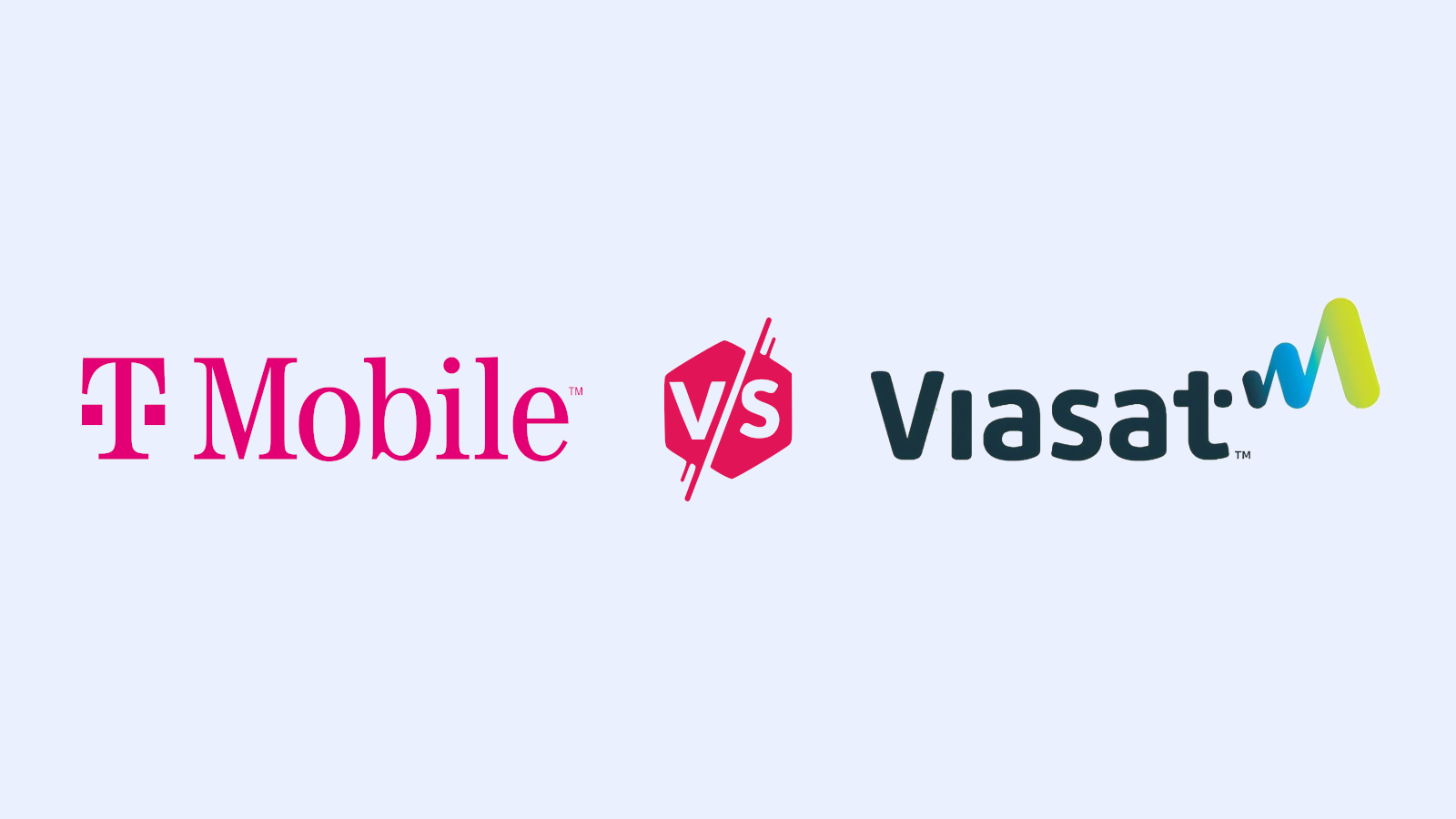Which Internet Service Providers Have Data Caps?
Jun 26, 2023 | Share
Brand Guides

Data caps are a monthly limit on the amount of data you can consume on your home internet. Using too much data leads to extra charges on your bill or drastically slowed internet speeds.
Many internet providers have data caps, but some don’t. Usually you can expect a monthly cap of 1TB. Xfinity offers a little more data (1.2TB per month), while providers like Google Fiber, Spectrum, and CenturyLink have no data caps at all.
See below for a list of major providers that have data caps—and those that offer unlimited data. You can also see the overage charges if you go over your data limit.
Want more data on your internet?
Type in your zip code below to find providers with no data caps in your area.
Which internet service providers have data caps?
Data as of 6/26/23. Offers and availability may vary by location and are subject to change.
Some of the biggest internet providers have data caps on their plans. Data caps are most common with cable, DSL, and satellite internet providers—the latter of which have especially strict caps.
If you’re worried about running out, don’t worry too much. Many providers let you buy more data, and some offer an unlimited data option for an extra fee on top of your monthly bill.
Which internet service providers have unlimited data (no data caps)?
| Provider | Type of service | Monthly data cap | See internet plans |
|---|---|---|---|
| Fiber | Unlimited | ||
| Cable, fiber | Unlimited in most areas (speed may slow after 2TB) | ||
|
| DSL, Fiber | Unlimited | |
| Fiber | Unlimited | ||
| Fiber | Unlimited | ||
|
| DSL, Fiber | Unlimited | |
|
| Cable | Unlimited | |
|
| Cable, fiber | Unlimited | |
| 5G | Unlimited | ||

| 5G, 4G | Unlimited | View Plan |

| Fiber and DSL | Unlimited |
Data as of 6/26/23. Offers and availability may vary by location and are subject to change.
How do you get unlimited data?
You can usually get unlimited data (or an extremely high data cap of 1TB or more) if you sign up for a gigabit internet plan, which gives you speeds around 1,000Mbps. Most fiber internet providers also offer unlimited data on their plans.
If you’re looking for a new provider that gives unlimited data on the house, you can also look into new services like Verizon 5G Home Internet and T-Mobile 5G Home Internet. Both of these emerging wireless services give you unlimited data along with a handful of other sign-up perks at no extra cost.
Reasons for needing unlimited data (or more than 1TB of data per month):
- You live with five or more people
- You regularly stream video in 4K
- You have multiple people in your household who regularly attend Zoom meetings
- You regularly host livestreams
You can find more information about managing your data budget farther down on this page.
Data caps for satellite internet
| Provider | Monthly data cap | Overage fees | See plans |
|---|---|---|---|
|
| Unlimited | None | |
 | Unlimited | None | |
| 60 GB–200GB (followed by internet slowdown) | None |
Exceeding your satellite data cap doesn’t lead to overage charges, but you do get throttled speeds
Satellite internet has very strict data caps. Since a satellite internet connection comes down from space, the provider has limited capacity to deliver fast speeds and plentiful data. That means you’ll have to be more budget-conscious about how much data you use.
Providers Hughesnet and Viasat give you a small amount of high-speed data upfront. Once you use that up, your internet traffic will be “deprioritized” and it’s likely your speeds will be reduced significantly—usually to around 1–3Mbps. The one benefit to this approach is it means you won’t get charged extra for exceeding your cap.
Starlink has no data caps—but don’t stream or game too much
After several months of wavering about whether it should impose data caps or not, Starlink has finally decided not to impose caps on its customers. In early May, Starlink deleted mentions of data caps from its website. SpaceX updated Starlink’s Fair Use Policy to say that Starlink’s residential and roam subscribers get an unlimited amount of “Standard” data per month.
However, if you consistently use a lot of data on a Starlink plan, the policy says that you may see throttled speeds as the provider manages network congestion. “Bandwidth intensive applications, such as streaming videos, gaming, or downloading large files are most likely to be impacted by such actions,” the policy states. Also, you need to upgrade to a “Priority” plan if you want data with faster internet speeds.
How much data do you need?
You need at least 600GB of data per month to do all the activities you usually do online without worrying about overage charges or network slowdowns. That could include anything from firing off tweets to downloading video games to streaming movies and shows.
Most internet providers give their customers 1TB of data to use per month. But some plans come with much less data than that, so watch out in case you use too much data. Be especially mindful of your data usage with satellite internet, fixed wireless internet, and cell phones.
What happens if you go over your data cap?
If you run out of data, you will likely be charged extra for any additional data you use. Internet providers that impose data caps usually charge $10 for every 50GB of data you go over your monthly limit.
You also may see drastically slowed speeds on your internet connection when you exceed your monthly data limit. Rather than charge you for excess data usage, cell phone companies and satellite internet providers typically “deprioritize” a user who has exceeded their cap, so that their web traffic gets moved to the back of line on the network behind other users. That slows your Wi-Fi to a crawl and makes it hard to do all but the most minimal tasks online.
Does AT&T have data caps?
AT&T has no data caps for its fiber internet plans. You get unlimited data with any of AT&T fiber internet plans, which range in speeds from 100Mbps to 5Gbps.
AT&T plans below 100Mbps come with a 1TB data cap. You get charged for data overages after the third time you exceed your cap. After that, it costs $10 for every additional 50GB of data you use.
AT&T’s fixed wireless internet plan—mostly used by rural internet customers in remote areas—comes with a 350GB data cap. Again, it costs $10 for every 50GB you go over.
Does Astound Broadband have data caps?
Yes, Astound Broadband enforces data caps in its three “Powered by Wave” service areas: Washington, Oregon, and California. They apply to all available speeds up to 600Mbps.
Astound charges $6.50 per 1–25GB block per month when you go over. You can add the Unlimited Data Plan for $20 per month or double your plan’s data allowance for $10 per month.
Astound’s 940Mbps fiber and cable internet plans in the Wave service areas include the Unlimited Data Plan at no extra cost. In all cases, speeds may slow after 2TB of data usage each month.
Astound does not enforce data caps on its enTouch, Grande, and RCN networks.
Does Xfinity have data caps?
Xfinity has a data cap of 1.2TB per month, with an overage fee of $10.00 per each additional 50GB. However, Xfinity will let a month of overages slide before it starts charging fees.
You can get the Unlimited Data option on any plan for an extra $30 per month. If you’re using more than 250GB of extra data consistently, this option works out to be cheaper than paying the overages, so spending those 30 clams might be worth it.
Does Frontier have data caps?
Nope, Frontier doesn’t have any data caps. Customers are free to download as many 40GB video games they want without worrying about going over a limit—no strings attached.
Does Google Fiber have data caps?
Google Fiber doesn’t have data caps. Yay! Feel free to use as much data as you like.
Does CenturyLink have data caps?
No, CenturyLink does not have data caps on its internet plans.
Does Windstream have data caps?
Windstream doesn’t have any data caps or usage limits in place. This is a refreshing stance in an industry that usually has fine print and hidden clauses.
-
Data cap: 250GB (Starter, Essential, and Ultimate plans), unlimited (Supreme and Gig Plus plans)
Does Buckeye Broadband have data caps?
Yes, Buckeye Broadband has a very low data cap of just 250GB per month for its Starter Internet, Essential Internet, and Ultimate Internet plans.
However, the Supreme and Gig Plus plans both come with unlimited data.
When you exceed your monthly cap (and, let’s face it, you definitely will with a data cap of just 250GB), you have to pay $15 for every additional 50GB of data you use. To keep that from happening, you can “pre-purchase” 150GB of data for $15 or add on unlimited to your plan for an extra $30 per month.
Does Spectrum have data caps?
Spectrum does not enforce data caps. You can use all the data you want on Spectrum plans.
Does Cox have data caps?
Cox has a 1.25TB data cap for all internet plans. 1.25TB is fairly generous, although it’s still possible for heavy streamers to exceed this. If you do, you’ll pay the industry standard of $10 for each 50GB of extra data you use.
You can get an extra 500GB for $29.99 per month. Unlimited data costs an extra $49.99 per month.
Does Optimum have data caps?
Optimum does not have data caps. It may crack down on data usage that it considers “excessive,” slowing your speed or suspending your account. For most users, though, it’s unlimited all the way.
Does Mediacom have data caps?
Yes, Mediacom has data caps. They vary widely from package to package but are generous once you get to the faster plans.
The cheapest package gives you just 200GB per month, but you get a ton more data on faster plans. Mediacom’s gigabit plan gives you an eye-popping 6,000GB (or 6TB) per month, which basically amounts to unlimited data for most users.
While we at HighSpeedInternet.com prefer no caps, this is one we could live with. Mediacom charges $10 per 50GB of data over the cap.
Does Verizon 5G Home Internet have data caps?
No. Verizon 5G Home Internet gives you unlimited data each month. You won’t need to worry about overage charges and you can use all the data you like.
Does T-Mobile Home Internet have data caps?
Nope. Like Verizon’s 5G Home Internet, T-Mobile’s LTE– and 5G–based residential internet package comes with unlimited data. So feel free to stream, download, or game to your heart’s content.
Does EarthLink have data caps?
No, EarthLink’s fiber and DSL plans do not have data caps. You can get unlimited data with this provider.
Earthlink’s fixed wireless plans, which have data limits similar to satellite internet, offer plans with data caps up to 150GB.
Does Hughesnet have data caps?
No, Hughesnet does not have data caps.
Does Viasat have data caps?
Viasat says it has unlimited data, but it still has limits on data usage. But you don’t get punished with overage charges like you would with a cable or DSL provider. Instead you’ll just have to deal with a really slow connection.
The amount of GB you get from Viasat depends on your plan. If you go over, Viasat will lay down the law by “deprioritizing” your traffic. That means when you click on a video or email, it will send a request to Viasat’s network. Viasat will then push you to the bottom of the list to make way for internet users who haven’t yet used up their allotted GB for the month.
It’s basically the satellite internet equivalent of the doorman at a fancy nightclub making you wait in line as he opens the velvet rope for dozens of well-dressed VIPs. Technically you’re getting “unlimited” internet, but in practice you’ll be the scrub standing outside in the rain.
Pro tip:
Read our internet data guide for tips on how to avoid data overage charges.
What is a data cap?
A data cap is the maximum amount of internet you’re allowed to use per month. It’s also commonly referred to by internet providers as “data usage,” “data limit,” “usage allowance,” or “fair use policy.”
Everything you do on the internet uses data. Whether you’re checking a couple emails or binge-watching The Crown in 4K, you’re using megabytes or even gigabytes of data. And all of that counts toward your monthly limit.
However, some providers don’t impose data caps. They may still have fair use policies in place to prevent you from abusing the service, but generally you’ll be free to use as much data as you like.
Type in your zip code below to see if there’s a provider that offers unlimited data in your area.
How do you find out your data cap?
You can find out your data cap by asking your internet service provider, looking on your internet provider’s website or consulting your internet’s user app or online dashboard. Most internet providers have a monthly cap of 1TB, but Xfinity offers 1.2TB per month. Some providers have unlimited data.
Everything you do on the internet uses data. Whether you’re checking a couple emails or binge-watching The Crown in 4K, you’re using megabytes or even gigabytes of data. And all of that counts toward your monthly limit.
However, some providers don’t impose data caps. They may still have fair use policies in place to prevent you from abusing the service, but generally you’ll be free to use as much data as you like.
Do you have caps on mobile data?
Yes, mobile phone providers have data caps. In fact, data caps on phone and mobile data plans are typically much stricter than what you get from a home internet plan. For example, if you can get 1TB of data per month on the average home internet plan, a mobile data plan gives you just 50GB of data per month or even less. Cellular carriers don’t have the same capacity to handle large numbers of internet customers and so mobile data comes at a higher cost.
How can you avoid going over your data cap?
To avoid going over your data cap, you’ll have to budget out your average data usage for the month, and then stick to your budget.
One way to do that is to use an online data calculator—like this one from the internet provider Armstrong—which gives you a quick readout of how much data it takes to do particular tasks.
Doing regular stuff like browsing the web and checking email won’t take up much data at all. Streaming music or playing games online also goes easy on your monthly allowance.
Here’s how much you’ll use on everyday online stuff:
- Sending/receiving 25 emails: .01GB
- Streaming an album: .06GB
- Gaming online for 5 hours: .60GB
- Streaming a 2-hour movie: 1GB in SD, 4GB in HD, 16GB in 4K
You’ll use up a lot more data by watching movies or TV on a streaming service like Netflix. Streaming in 4K uses up four times as much data as HD, so consider limiting your 4K viewing to special occasions. (A Hobbit trilogy movie marathon, perhaps?)
Downloading files is where you really gotta watch out. The richer and more high-tech the file, the more gigs you’ll use—that means you’ll spend a lot more data downloading prestige video games than you would a handful of MP3s.
This is about how much data it takes to download files:
- An MP3: 5MB
- An HD movie: 4GB
- The most recent update of Call of Duty: Modern Warfare: 60GB (Not the full game, mind you—just the update.)
If you have smart home devices around the house, that may end up taking the lion’s share of your data usage. Thankfully, as Viasat points out, you can cut corners by adjusting the resolution of your home security cameras and being choosy about how you use your smart home assistant.
This is the approximate data used each month by the following smart home devices:
- A smart thermostat: 50MB
- A voice assistant: 22GB
- A motion-activated HD security camera: 150GB
FAQ about internet data caps
What is my data cap?
Your data cap is the amount of data you can use on your home internet each month without incurring overage fees or speed slowdowns. Many internet providers impose a monthly data cap of 1TB, while Xfinity has a cap of 1.2TB per month. However, there are also internet providers that have no data caps and let you use unlimited data all month.
Which providers have data caps?
The following providers offer data caps of differing amounts along with overage fees of varying degrees. All of them (except for HughesNet and Viasat) also have packages with unlimited data or offer it at an additional monthly charge.
- Xfinity
- Cox
- Mediacom
- Sparklight
- HughesNet
- Viasat
- AT&T
- Astound Broadband (WA, OR, and CA only)
Which providers don’t have data caps?
The following providers currently have no data caps on any of their plans:
- CenturyLink
- Astound Broadband (in most areas)
- EarthLink
- Frontier
- Windstream
- Spectrum
- Optimum
- T-Mobile Home Internet
- Verizon 5G Home Internet
What is bandwidth throttling?
Bandwidth throttling is the practice of lowering internet speed (often significantly) for certain users or certain types of traffic. This is typically done when an individual is using excessive amounts of data in a single monthly period. Due to customer backlash, it’s not a very common practice because it involves getting less service than you’re paying for.
Throttling is also sometimes used to manage network load during peak times. In these cases, providers may lower bandwidth of some (or all) users slightly to ensure that the network functions as expected for most customers. This is one reason why you may see a lower-than-advertised speed when using a speed test.
Author - Peter Holslin
Peter Holslin has more than a decade of experience working as a writer and freelance journalist. He graduated with a BA in liberal arts and journalism from New York City’s The New School University in 2008 and went on to contribute to publications like Rolling Stone, VICE, BuzzFeed, and countless others. At HighSpeedInternet.com, he focuses on covering 5G, nerding out about frequency bands and virtual RAN, and producing reviews on emerging services like 5G home internet. He also writes about internet providers and packages, hotspots, VPNs, and Wi-Fi troubleshooting.
Editor - Cara Haynes
Cara Haynes has been editing and writing in the digital space for seven years, and she's edited all things internet for HighSpeedInternet.com for five years. She graduated with a BA in English and a minor in editing from Brigham Young University. When she's not editing, she makes tech accessible through her freelance writing for brands like Pluralsight. She believes no one should feel lost in internet land and that a good internet connection significantly extends your life span.






